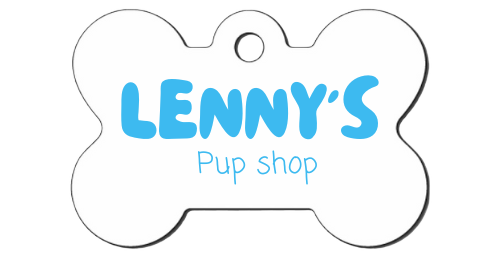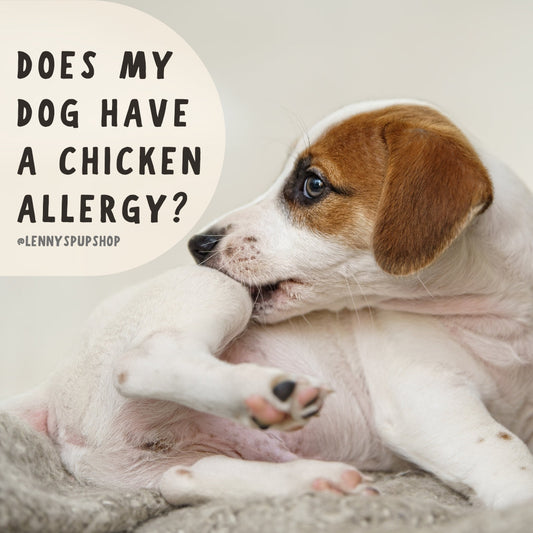Does my dog have a chicken allergy?
Share
Chicken Allergy in Dogs: Symptoms, Causes, and Treatment
Is your dog constantly scratching, suffering from recurring ear infections, or showing signs of digestive discomfort? These could be signs of a chicken allergy. Chicken is one of the most common food allergens in dogs and is found in many commercial dog foods and treats. At Lenny’s Pup Shop, we believe that every dog deserves food that supports their unique health needs. Here’s everything you need to know about chicken allergies in dogs, how to recognise the signs, and what you can do to help.
What Is a Chicken Allergy in Dogs?
A chicken allergy occurs when your dog’s immune system reacts negatively to chicken protein. This reaction causes inflammation that can affect the skin, ears, digestive system, and overall comfort. While chicken is a popular protein due to its lean content and high digestibility, some dogs are sensitive or allergic to it. This sensitivity can develop at any point in a dog’s life and is more common in breeds prone to allergies, such as Retrievers, Terriers, Bulldogs, and Shih Tzus.
Chicken Allergy Symptoms in Dogs
Symptoms of a chicken allergy can appear on the skin, in the ears, or through digestive issues. These symptoms can range from mild to severe and may include:
- Itchy skin, especially on paws, belly, face, or ears
- Red, inflamed skin or hot spots
- Bald patches and fur loss
- Persistent ear infections
- Gastrointestinal issues like vomiting, diarrhoea, and gas
- Chronic licking or biting of paws
- Scooting due to anal gland irritation
If your dog is showing any of these signs regularly, it’s time to investigate their diet.
Can Puppies Be Allergic to Chicken?
Although less common, puppies can develop a chicken allergy. Food allergies usually take time to develop, but puppies exposed to chicken early and frequently may become sensitised to it. Symptoms in puppies are similar to those in adult dogs and should not be ignored, especially if they lead to behavioural changes or growth issues.
Causes of Chicken Allergies in Dogs
Chicken allergies are typically caused by a hypersensitive immune response. The body sees chicken protein as a threat and releases antibodies, which causes inflammation. Repeated exposure to the same protein over time can increase the risk of developing an allergy. Genetics may also play a role, especially if one or both parents were allergy prone.
Other factors include:
- Excessive exposure to chicken in food and treats
- Leaky gut syndrome, which allows proteins to enter the bloodstream
- Cross-contamination in food manufacturing or home preparation
- Flavoured medications or treats that contain hidden chicken ingredients
Diagnosing a Chicken Allergy
There is no single test to confirm a food allergy. Instead, most vets recommend an elimination diet. This involves feeding your dog a novel or hydrolysed protein diet for 8 to 12 weeks, avoiding all other food sources, treats, and flavoured supplements.
If your dog’s symptoms improve during this time, chicken is then reintroduced. A return of symptoms confirms the allergy. In some cases, your vet may also perform skin or blood tests to rule out other conditions or allergens.
Treatment for Chicken Allergies in Dogs
The best treatment is strict removal of chicken from your dog’s diet. This includes not just meat but also chicken by-products like broth, fat, and flavourings. Be vigilant when checking ingredient labels. Chicken can hide in unexpected places such as:
- Treats and chews
- Toothpaste
- Flavoured medications or supplements
- Rawhides or meat-scented toys
Secondary skin or ear infections from scratching may require antibiotics or antifungal treatments. Anti-itch medication may also be used short-term to relieve discomfort.
Switching to a Chicken-Free Diet
Finding the right food is key. Look for limited-ingredient, single-protein diets or prescription formulas. Novel proteins like venison, kangaroo, rabbit, or fish are good options. Hydrolysed protein diets are also effective because the protein is broken down into particles too small to trigger the immune system.
Make sure to transition your dog slowly to their new food to avoid digestive upset. Mix the new food with the old over 7 to 10 days, gradually increasing the new food ratio.
Can Dogs Be Allergic to Both Chicken and Turkey?
Yes, but not always. Chicken and turkey are both poultry proteins and share similar structures. Some dogs allergic to chicken can tolerate turkey, while others cannot. It’s best to avoid all poultry unless guided otherwise by your vet. (Our poor Lenny is allergic to both!)
Natural Supplements and Support
Omega-3 fatty acids and probiotics can help manage allergy symptoms. They reduce inflammation, promote healthy skin, and support the gut. Always consult your vet before starting supplements to ensure proper dosage and safety.
Can Dogs Develop a Chicken Allergy Suddenly?
It may seem sudden, but allergies develop over time. If your dog starts reacting to chicken after years of eating it, their immune system has likely become sensitised. This is why rotating protein sources throughout your dog’s life is a good preventive strategy.
How Lenny’s Pup Shop Helps Dogs with Chicken Allergies
At Lenny’s Pup Shop, we know how challenging managing food allergies can be. That’s why we offer a range of allergy-friendly treats that are 100% natural and free from chicken. Our treats feature single ingredients like kangaroo, beef or fish and with no fillers or preservatives.
Looking for chicken-free options? Explore our top picks:
- Fish Fingers made from 100% Aussie flathead
- Beef Liver Snaps packed with iron and protein
- Roo Cleaners, a dental chew alternative
- Emu Femurs for long-lasting chew satisfaction
- Our Arthritis Pack, perfect for sensitive dogs needing more omega-3
We’ve seen firsthand how switching to natural, chicken-free treats can transform a dog’s skin, energy, and happiness. CEO Lenny, our Golden Retriever, has chicken allergies himself, so we understand the struggle.
Lastly...
If you suspect your dog has a chicken allergy, don’t worry. With the right support, food, and care, your pup can live a healthy and itch-free life. The most important step is getting a diagnosis from your vet, following an elimination diet, and finding a new diet that works for your dog.
At Lenny’s Pup Shop, we’re here to help you every step of the way. Visit our shop to explore chicken-free treats or contact us with any questions about your dog’s unique needs.
Browse our allergy-friendly treats today at lennyspupshop.com.au



